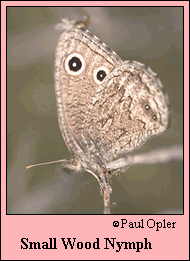 |
 

 |



Small Wood Nymph (Cercyonis oetus [Boisduval])
Wing span: 1 1/4 - 1 3/4 inches (3.2 - 4.5 cm).
Identification: Wings are light to very dark brown; wing fringes are checkered. Upperside of forewing usually has 1 eyespot in the male, 2 eyespots in the female; upper eyespot is larger. Underside of forewing of both sexes has lower eyespot smaller and nearer to the wing edge than the upper eyespot.
Life history: Males patrol all day for females, who deposit eggs singly on the host plant. First-stage caterpillars hibernate unfed until the following spring.
Flight: One brood from June-August.
Caterpillar hosts: Unknown grasses.
Adult food: Flower nectar.
Habitat: Dry chaparral, sagebrush, grasslands, scrub, open woodland, meadows.
Range: British Columbia east to southern Saskatchewan and western North Dakota; south to eastern California, Nevada, central Arizona, and New Mexico.
Conservation: Not usually required.
The Nature Conservancy Global Rank: G5 - Demonstrably secure globally, though it may be quite rare in parts of its range, especially at the periphery.
Management needs: None reported.
References:
Scott, J. A. 1986. The butterflies of North America. Stanford University Press,
Stanford, Calif. 583 pages, 64 color plates.
Tilden, J. W. 1986. A field guide to western butterflies. Houghton-Mifflin Co.,
Boston, Mass. 370 pages, 23 color plates.
Author: Jane M. Struttmann
State and Regional References:
Bailowitz, R. A. and J. P. Brock. 1991. Butterflies of Southeastern Arizona.
Tucson, Ariz.: Sonoran Arthropod Studies, Inc.
Garth, J.S. 1950. Butterflies of Grand Canyon National Park. Grand Canyon
Natural History Association, Grand Canyon, Ariz.
Opler, Paul A. 1999. Peterson Field Guide to Western Butterflies, revised
edition. Houghton Mifflin Co., Boston, Mass.
Stanford, R.E. and P.A. Opler. 1993. Atlas of Western USA Butterflies.
Privately published, Denver, Colo.
Tilden, J.W. and A.C. Smith. 1986. A Field Guide to Western Butterflies.
Houghton Mifflin Co., Boston, Mass.

